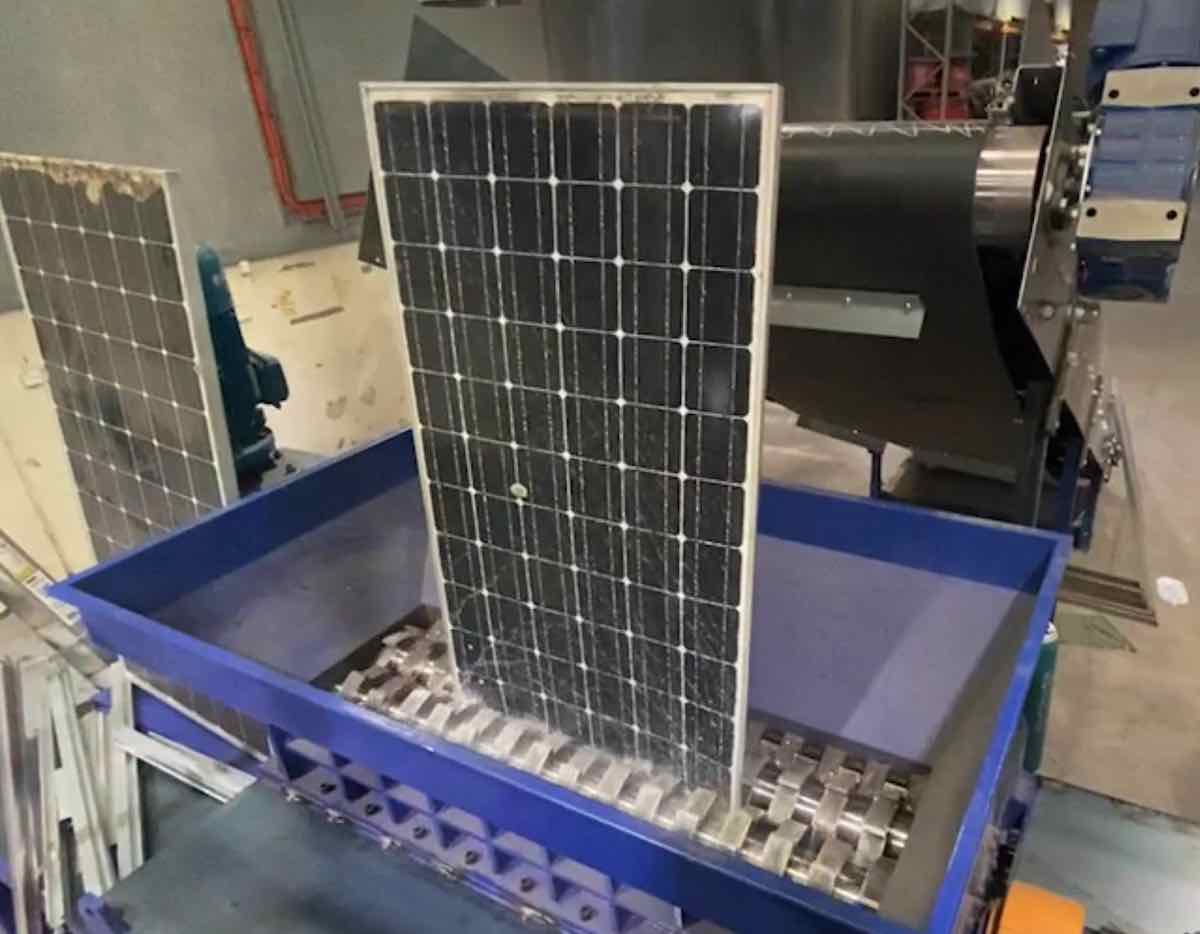Two months after the renewable energy industry warned that the lack of a mandatory national stewardship scheme was putting solar recyclers “on the brink” of failure, one of Australia’s biggest market hopefuls has been put into administration.
Sircel, Australia’s largest established e-waste recycler, had recently turned its focus to solar panels, including with the recent launch of a world-class PV panel processing facility in Parkes in its home state of NSW.
But news emerged on Thursday that the Sydney-based company had gone into voluntary administration, with KordaMentha partners Richard Tucker and Ryan Rabbitt appointed as administrators on October 31 ahead of a first creditor meeting on November 12.
The new solar division was not the cause of the e-waste company’s financial distress however, and the company’s operations are continuing to be run as business-as-usual, Sircel said in a statement sent to Renew Economy.
It also disputes that the administrators are needed.
“We can confirm that a voluntary administrator has been appointed on behalf of a purported secured creditor – this applies to Sircel Limited and subsidiary Sircel Recycling,” the statement says.
“In addition, purported receivers and managers have been appointed by a secured creditor to Sircel Limited and its subsidiaries Sircel Recycling and Sircel Refining.
“The directors of Sircel Limited dispute the validity of both appointments and are taking legal advice as to the validity of the appointments.
“Until there is clarity as the appointment of the administrators and the receivers and managers, which we dispute … we are cooperating with and will follow the reasonable requests made by the administrators and receivers and managers.”
Shock, dismay swirls around Sircel news
The news will be all too familiar to Australia’s recycling industry, which has so far failed to support solar recycling attempts including Reclaim PV, an Adelaide company that went bankrupt in 2023.
Indeed, Australian-owned Sircel’s own shift into this field came from buying the relevant parts out of e-waste company Scipher Technologies when it went bankrupt in 2024.
At the time, Sircel secured $5 million from venture fund Kilara Capital, part of which was to be for building out the solar module recycling facility in Parkes.
Following the acquisition, Karam told Renew Economy that Sircel was starting conversations with state authorities on how to support recycling at scale, and he was concerned about a race to the bottom where “a guy with a hammer, who knocks a frame off a solar panel is called a recycler”.
Sircel’s statement today says the plant “has been commissioned for some time” and it’s currently talking to feedstock suppliers.
Three months ago, Sircel said on LinkedIn it was “recycling solar panels every day”.
But the dearth of information about why Sircel entered voluntary administration today had industry people worried.
“It’s unfortunate for the industry,” Neeraj Das told Renew Economy, managing director of solar recycler Elecsome.
“But it’s also surprising because after their acquisition of Scipher, we were definitely thinking that even though Sircel is more in the e-waste sector, they would be a serious player in solar recycling who will stay in the country.”
For others, however, it’s another reason to nudge governments about the cost of repeated inaction on supporting this end of the solar supply chain.
In September, a delegation to Canberra led by the Smart Energy Council said this corner of the industry was “on the brink” because the expected wave of solar panels into recycling hadn’t eventuated.
“The recycling industry is on the brink,” it said in a joint statement. “Australia’s recycling industry has invested in world-class technology capable of 95%+ material recovery, but it is at risk of decline.
“Without a steady, reliable supply of panels – which this pilot would provide – recyclers cannot achieve economies of scale. They may shut down, risking the permanent loss of jobs, sovereign capability, and investor confidence.”
Where are all of the waste solar panels?
Ironically, given the Smart Energy Council estimates 4 million solar panels head to waste each year, Das says the pressures on his industry include not being able to source enough panels for recycling.
“What is mainly affecting a lot of companies is the high upfront capital investment,” he says.
“You’re burning a lot of cash, but initially the number of panels coming in is not high enough to justify that capital investment and labour cost, or match the numbers of panels estimated to be available.”
Das says Elecsome has secured a steady flow of panels from major solar farms and volumes are good.
That feedstock issue is at the core of what the Smart Energy Council’s Darren Johanessen says is the industry’s biggest problem: logistics.
Johannesen says without a mandated, national product stewardship scheme – the kind state and federal governments promised in August to investigate – the cost of transporting panels, be they residential or from large scale farms, just can’t compete with sending them to landfill.
Only Victoria bans solar panels from being sent to landfill.
It means panels, particularly in most of Australia where the still-fledgling industry doesn’t have a footprint, are being stockpiled or dumped.
“The biggest problem that recyclers face right now is access to the modules,” Johannesen told Renew Economy.
“If they can access the modules then they have a pathway to scale and then to profit and investment. But they can’t get access to the feedstock, because nobody wants to pay that logistics leg. In the absence of nationwide landfill bans, the cost of logistics means it’s almost always cheaper to go to landfill.”
He believes the solution is a national mandatory product stewardship scheme, which factors in the cost of those logistics and the recycling through a pre-paid fee.
His expectation is that once supply lines are set up for recycling, that cost should fall by at least 50 per cent.
Das is less sure about whether such a scheme will help. He says it could be helpful, but equally useful would state governments taking a razor to planning application timeframes, and electricity networks speeding up connection processes.
Recycling need becomes more urgent
The pressures on recyclers are matched by the urgent need to support a solar panel recycling industry in Australia.
Notwithstanding social expectations that renewables maintain a halo of being clean as well as green, the wave of solar waste combined with a need for the materials inside them is becoming desperate.
“The big issue for Australia is the conversation around critical minerals. Globally we are experiencing shortages of copper and silver,” Johannesen says.
“We’re already in a structural deficit [for silver]… with copper the IEA forecast is that by 2030 we’ll have a 10 per cent shortfall of copper, by 2035 that number is 35 per cent and by 2050 that number is 50 per cent.
“From my perspective, decommissioned solar PV modules contain about $6.5 billion worth of recoverable materials.
“It represents Australia’s largest single source of silver, so it’s Australia’s biggest silver mine. It’s worth about $1 billion worth of capital investment in terms of materials recovery and it represents about 2000-5000 jobs.”
Aside from governments saying they’re considering a product stewardship scheme, there are some bright lights remaining in Australian solar recycling.
The Smart Energy Council’s partner for its Queensland recycling pilot last year, Pan Pacific, is still in the business as is PV Industries.
Longstanding Victorian company Lotus Recycling said on LinkedIn in March that it will expand to Germany, with help from the federal government there.

Rachel Williamson is a science and business journalist, who focuses on climate change-related health and environmental issues.


